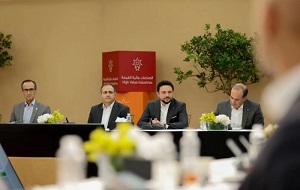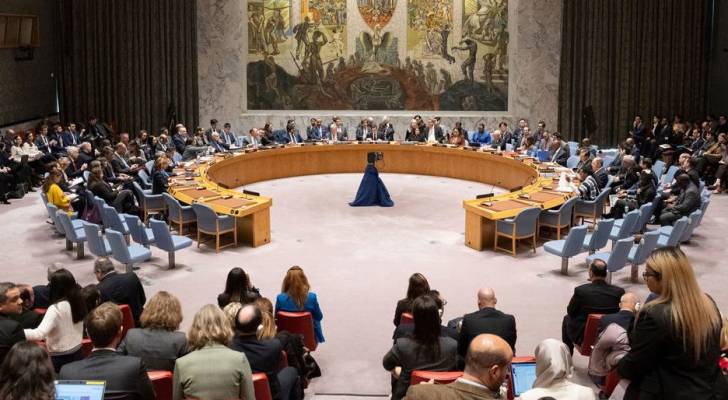EMV workshops highlight education reform priorities
The Jordan Times
AMMAN — The Economic Modernisation Vision (EMV) workshops continued Sunday at the Royal Hashemite Court with a dedicated session focused on the education sector, reiterating its pivotal role in preparing skilled human capital, boosting national competitiveness and supporting inclusive, sustainable economic development.
The session gathered officials from government bodies, leading education experts, and representatives from the privae sector to assess the progress achieved so far and set strategic priorities for the next phase of implementation.
Participants stressed the critical contribution of education to sustainable economic growth, highlighting the importance of aligning the sector with evolving labour market demands. Equipping young Jordanians with market-relevant skills, enhancing system flexibility to respond to international and regional shifts, and improving educational outcomes were at the top of the agenda.
Education remains a cornerstone of the EMV, which recognises it as essential to preparing youth to meet future challenges and take part in the knowledge-based, innovation-driven economy envisioned by the plan. The EMV also outlines four interrelated sub-sectors in education: Early Childhood Development, Basic and Secondary Education, Higher Education, and Technical and Vocational Education and Training (TVET). Each of these areas features ambitious goals tailored to Jordan’s national needs.
Early childhood initiatives were focused on establishing an inclusive and equitable system grounded in child development principles, while efforts in higher education aim to foster a research-based, tech-integrated learning environment. TVET, in turn, is being reshaped to produce a skilled, job-ready workforce that responds to the needs of key economic sectors.
The sessions also highlighted the education sector's notable strengths, such as a comprehensive national education strategy and infrastructure that outpaces regional counterparts. The country offers a relatively secure and stable learning environment, a factor which has helped support high enrolment and gender parity rates. Among the major achievements cited were the 97 per cent enrolment in basic education, improvements in the reputation of both public and private schools, and positive momentum in increasing access to higher education.
Higher education institutions in the Kingdom also continue to attract domestic and international students, cementing Jordan’s status as a regional academic hub. At the same time, the TVET sector has gained traction due to reforms aimed at increasing responsiveness to the labour market, including updated curricula, the rollout of the National Qualifications Framework, and the establishment of the Skills Development Commission.
During the first implementation phase of the EMV, several key reforms were enacted. These included developing new curricula for early childhood, streamlining nursery licensing procedures, encouraging the creation of workplace nurseries, and integrating digital transformation across the TVET ecosystem.
Other milestones featured legislative amendments to improve the rights of people with disabilities, the nationwide rollout of a new kindergarten curriculum, a framework for university accreditation, and a national TVET strategy that has already impacted over 79,000 individuals.
Former minister of education Taisir Nuaimi commended the inclusive and institutional approach of the workshops. He noted that this participatory spirit reflects the Royal vision that guides the EMV. “His Majesty King Abdullah pays close attention to the vision and follows its implementation closely,” Nuaimi said.
Commenting on the current status of reforms, Nuaimisaid that while many initiatives are progressing well, it is still “too early” to judge their full impact. He highlighted digital transformation as a key priority, urging a stronger integration of technology into all aspects of the learning process. To support this, he identified three critical pillars: modernising curricula, upgrading school infrastructure, and investing in teacher training.
“We must focus on digital skills, particularly artificial intelligence, and ensure they are embedded across all student curricula,” he said. “This is the era we’re living in. Schools must be connected to fibre-optic broadband, equipped with science and computer labs, and supported with high-quality, hands-on teacher training; not just for ICT, but for Arabic, Islamic studies, mathematics, and science as well.”
Addressing the issue of mismatch between education outcomes and market needs, Nuaimi emphasised that the challenge lies not in the number of graduates but in the relevance of their skills. “We need to ask: What skills does the textile industry require? What about ICT? We must go beyond counting job seekers and start analysing the specific qualifications employers need.”
To tackle this, he proposed the creation of a National Labour Market Observatory, which would identify emerging skill demands and guide the redesign of school, university, and vocational programmes accordingly.
Nuaimi also underscored the importance of teachers in the reform process. “The teacher is the foundation of all successful educational change. No system can outperform the quality of its educators. Reform starts with attracting skilled teachers, developing clear professional pathways, and offering meaningful incentives.”
He added that social support is needed to restore respect for teachers, alongside institutional efforts to create safe, supportive environments in schools. “We must help teachers focus on their essential mission: developing students’ capabilities and skills.”
Former minister of higher education Labib Khadrastressed the role of universities in advancing innovation and applied scientific research. He highlighted two strategies to strengthen research: adjusting promotion criteria to value applied work and forming stronger links between academia and industry.
“Universities must prepare students for a global economy,” Khadra said. “The challenges we face in Jordan, in technology, health, or sustainability, are not so different from those in the US or EU. We are part of a shared innovation ecosystem.”
He stressed that while many universities have adopted the language of innovation and entrepreneurship, practical implementation remains weak. “You cannot teach innovation through slogans. It requires time, space, mentorship, and the ability to fail and try again. Students need labs, not just lecture halls.”
He also called for integrating theoretical and practical learning, for example, combining statistics with coding, or mathematics with IT, and stressed that all STEM students, regardless of discipline, must master coding. “In the Fourth Industrial Revolution, coding and soft skills are no longer optional.”
When asked about limited research budgets, Al Khadrasaid that structural reform matters as much as funding. He encouraged faculty to align research with international challenges and push students to be lifelong learners. “If a student needs to be pushed to keep learning after graduation, that means something went wrong in the teaching process.”
He also called on the Higher Education Accreditation Commission to factor in alignment with global technology trends as a core criterion in academic evaluations. “High-quality education is education that prepares students to contribute meaningfully to the modern economy.”
Employment and recruitment expert Shereen Abadipointed out that the problem isn’t simply the lack of graduate skills; it’s the lack of opportunities to apply them. “Students often don’t have enough exposure to real-world problems where they can use their knowledge,” she said.
Abadi noted that with the EMV’s focus on high-skill sectors such as ICT, engineering, and creative industries, opportunities for hands-on learning are gradually expanding. However, more needs to be done to ensure the private sector is engaged.
“Vocational and technical education is key to solving Jordan’s employment challenges,” she said. “We still have shortages in skilled workers, especially at the technical level. Specialised training centres across the Kingdom are essential for filling this gap, offering programmes in welding, hybrid vehicle repair, IT, and hospitality.”
She stressed that improving working conditions is crucial to attracting youth to the private sector. “Companies that offer career growth, work-life balance, and continuous learning are the ones that retain talent. If we want the private sector to help solve youth unemployment, we need to empower it to do so.”
Latest News
-
 Trump says Gaza ceasefire 'possible' amid Starmer talks
Trump says Gaza ceasefire 'possible' amid Starmer talks
-
 Crown Prince attends ICT session within economic vision’s second phase workshops
Crown Prince attends ICT session within economic vision’s second phase workshops
-
 Jordan carries out two more Gaza aid airdrops, with UAE participation
Jordan carries out two more Gaza aid airdrops, with UAE participation
-
 Trump: I spoke with Netanyahu, working on plans for Gaza
Trump: I spoke with Netanyahu, working on plans for Gaza
-
 Two-state solution back in focus at UN peace summit
Two-state solution back in focus at UN peace summit